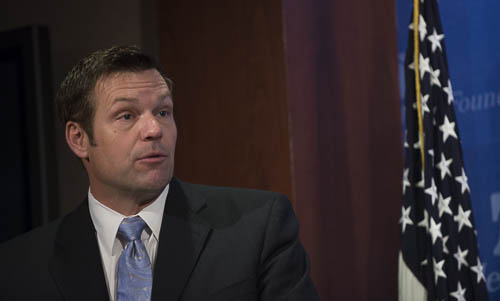In the run-up to the Nov. 4 midterm elections, the courts have weighed in on voting rules, both supporting and rebuking efforts by Republican state governments to prevent fraud.
The Supreme Court last week upheld a North Carolina voting law that bars same-day registration and doesn’t allow the counting of votes cast in the wrong precinct.
A day later, the Supreme Court stopped Wisconsin from requiring voters to provide photo identification before casting their ballots, and a federal trial court in Texas struck down the state’s voter ID law.
The Daily Signal depends on the support of readers like you. Donate now
The legal fights come as critics argue that the restrictions are meant to discourage blacks, immigrants, students and low-income voters — groups who tend to favor Democrats.
The official who administers elections in Kansas — the first state to require proof of citizenship for everyone registering to vote — defends his state’s law as “the best way to prevent voter fraud.”
Kansas Secretary of State Kris Kobach, speaking Tuesday at an event at The Heritage Foundation, said the state’s Secure and Fair Elections Act has had little impact on voter turnout and “legitimized” what took place at the polls.
“Voter fraud exists and it’s everywhere,” Kobach told The Daily Signal in an interview after the event, which also featured Colorado Secretary of State Scott Gessler and Catherine Engelbrecht, president of True the Vote. Kobach added:
The best way to stop voter fraud is to stop it at the front end rather than hope you can detect it at the back end and prosecute it. You have to put these systems in place so only legitimate U.S. citizens are on the voter rolls, and also to ensure when a person shows up to vote he is who he says he is.
Voter Turnout
Kansas is now one of four states, along with Arizona, Alabama and Georgia, that have proof-of-citizenship requirements.
Kobach, who is running for re-election, says the 2011 Kansas law blocked the registrations of a dozen or so non-residents.
He calls the notion that voter ID laws target minority groups an “outrageous argument.”
Since the 2010 election, 22 states have passed new voting restrictions or requirements, according to the Brennan Center for Justice.

Photo ID hasn’t ‘significantly affected voter participation,” Kris Kobach says. (Photo: Steve Purcell)
>>> Watch the Event: Keeping Elections Honest
The Kansas law, besides requiring that voters present a photo ID, tightened the security of absentee mail-in ballots.
A report released last week by the Government Accountability Office suggested that voter ID laws were responsible for decreased turnout in some states in 2012, including Kansas.
The report compared turnout in Kansas and Tennessee—states that tightened voter ID requirements between the 2008 and 2012 elections—to voting in four states that didn’t change identification requirements.
It estimated that reductions in voter turnout were about 2 percent greater in Kansas than in other states examined.
Kobach criticizes the study’s methodology and disputes its findings.
“The photo ID law has not significantly affected participation,” Kobach said.
The GAO report is based on lots of sloppy data because they compare apples to oranges. The best way to determine if voter ID affects a particular state is to look at that state’s own history of voting and look at a comparable election.
>>> Election Litigation Developments in Ohio, Kansas and North Carolina
Kobach argues that Kansas is unique in that once every 12 years, as in 2012, the state has no U.S. senator on the ballot.
So he says the 2012 data should be compared to 2000, the last time the election did not include a Senate race.
If that were the case, he said, “lo and behold we found the numbers are almost exactly the same from 2000 (66.7 percent voted) and 2012 (66.8 percent voted).”
Disputed Intent
Still, parts of the Kansas voting law remain in dispute.
Kansas and Arizona are the plaintiffs in litigation against the U.S. Election Assistance Commission, seeking to require that state residents show proof-of-citizenship when registering to vote using federal forms.
The Brennan Center for Justice represents another of the defendants—the League of Women Voters of the United States—in the lawsuit.
Wendy Weiser, director of the democracy program at the Brennan Center, argues that laws such as the Kansas one have no practical goal, but rather are political maneuvers.
“For decades and centuries the priority has been to expand access to voting, but suddenly we’re seeing a sharp shift making it harder to vote,” Weiser told The Daily Signal, adding:
This is all in a context where there’s evidence that these laws are being passed for political reasons. There are reasons to be suspicious because these restrictions are popping up in places with high minority voter turnout. …
The predominant view among experts is that though there is a need to protect election integrity, our system already does that.





























